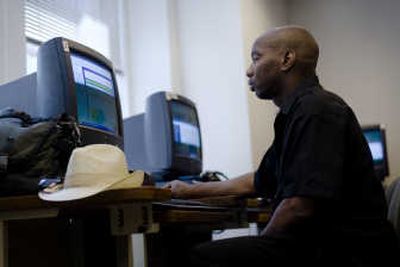Double whammy for economy

Economists looking for signs of trouble found a double dose of it Friday, as unemployment surged and the price of crude oil soared to a record high. Stocks went into a tailspin, with Dow Jones industrials plunging nearly 400 points.
First came news that the nation’s joblessness rate shot up in May to 5.5 percent – its highest level since 2004 and the largest one-month increase since 1986. That was followed by oil’s biggest one-day jump in history.
The employment report, showing a fifth straight month of job losses, bolstered fears that the country is in a recession, which some analysts recently suggested might be averted.
“At this point, if you look at the string of declines in employment, we’re in a borderline recession situation by any standard,” said Brian Bethune, an economist with forecasting firm Global Insight in Lexington, Mass.
Peter Morici, an economist at the University of Maryland, called the job report “the strongest evidence yet” that the economy “has slipped into a recession of uncertain depth and duration.”
In Washington the dour unemployment report quickly became fodder for politicians, who expect the economy to dominate the presidential campaign.
“This is a reminder that working families continue to bear the brunt of the failed Bush economic policies that John McCain wants to continue for another four years,” Sen. Barack Obama, D-Ill., said in a statement.
“We have to restore trust and confidence in government that we’re not having an out-of-control spending situation,” said Sen. John McCain, R-Ariz., who went on to criticize Obama for favoring “the failed policies of the ‘60s and ‘70s.”
President Bush acknowledged the bad job news but maintained that a surge of new job seekers was behind the report.
On Capitol Hill, debate intensified over whether Democrats should once again try to extend benefits for the unemployed – a measure Bush has vetoed in the past.
“We hope these numbers will cause the president to rethink his opposition to an extension of unemployment benefits,” Sen. Charles Schumer, D-N.Y., chairman of Congress’ Joint Economic Committee, said as he opened a hearing on the employment numbers.
“Today’s jobs report is just another wake-up call for this administration to quit its threats to veto additional unemployment insurance for hard-hit workers and to actively work with Congress to address the more systemic problems dragging down our economy.”
Unemployment also jumped in Idaho – up 0.5 percent in May – to 3.6 percent. But that’s still below what most economists consider full employment.
Washington’s May jobless figures are due to be released June 17. The state’s seasonally adjusted jobless rate was 4.7 percent in April, and Spokane’s was 5.1 percent that month.
In a further sign of strain on consumers, the Federal Reserve reported that consumer debt rose faster than expected in April, as many Americans apparently turned to credit cards to fund their everyday purchases.
The Wall Street sell-off exposed a deep vein of uncertainty running through the stock market. Investors, who had recently grown more sanguine about the prospects for the economy, suddenly confronted the specter of extended job losses compounding the continuing effects of falling home values and ballooning gasoline prices. The worry is that consumer spending will give way, denting corporate earnings and further weighing on stock prices.
As for unemployment, some economists agreed with Bush that a larger than expected wave of entrants into the labor market – primarily college and high school graduates – appeared to swell the numbers of unemployed counted in May.
“These figures should be taken with a grain of salt, as school-leavers probably skewed them this month,” Joshua Shapiro, chief U.S. economist at economic forecasting firm MFR Inc., wrote in a note to subscribers.
But Morici, of the University of Maryland, said discouraged workers leaving the work force more than outnumbered the number of graduates jumping in.
Generally, economists said they were less impressed by the sudden jump in the unemployment rate than with the cumulative contraction in U.S. payrolls over the last five months, including May’s net loss of 49,000 jobs. The economy needs to create about 100,000 jobs a month to keep pace with population growth.
Bethune, of Global Insight, said increases in the unemployment rate – which is based on a phone survey of households – tend to lag behind reductions in payroll jobs, which are tallied based on a survey of employers. In other words, the country’s job losses since the winter hadn’t been fully reflected in the jobless rate.
“We had been expecting that the shoe would drop,” Bethune said.
Economists said the job losses increased the chance that the economy was in a recession.
But Lee Ohanian, an economist at the University of California, Los Angeles, said the economy had shown remarkable resiliency in the last few months. It appears, he said, that increased energy efficiency has made the economy less vulnerable to higher oil prices. And despite job losses, consumer spending – which accounts for two-thirds of the economy – has remained strong.
“This is a really unique economic episode,” Ohanian said. “We have rapidly increasing oil prices, rapidly decreasing house prices and an increase in unemployment. But we still have healthy consumer spending and healthy productivity growth.
“Whether we go into a recession depends on which (set of) forces wins out. It’s really too early to tell.”
Also today
Economic indicators
In Idaho: State’s unemployment rate takes a record jump.
Oil prices: Another spike spells bad news for Fourth of July travelers.
Page A8